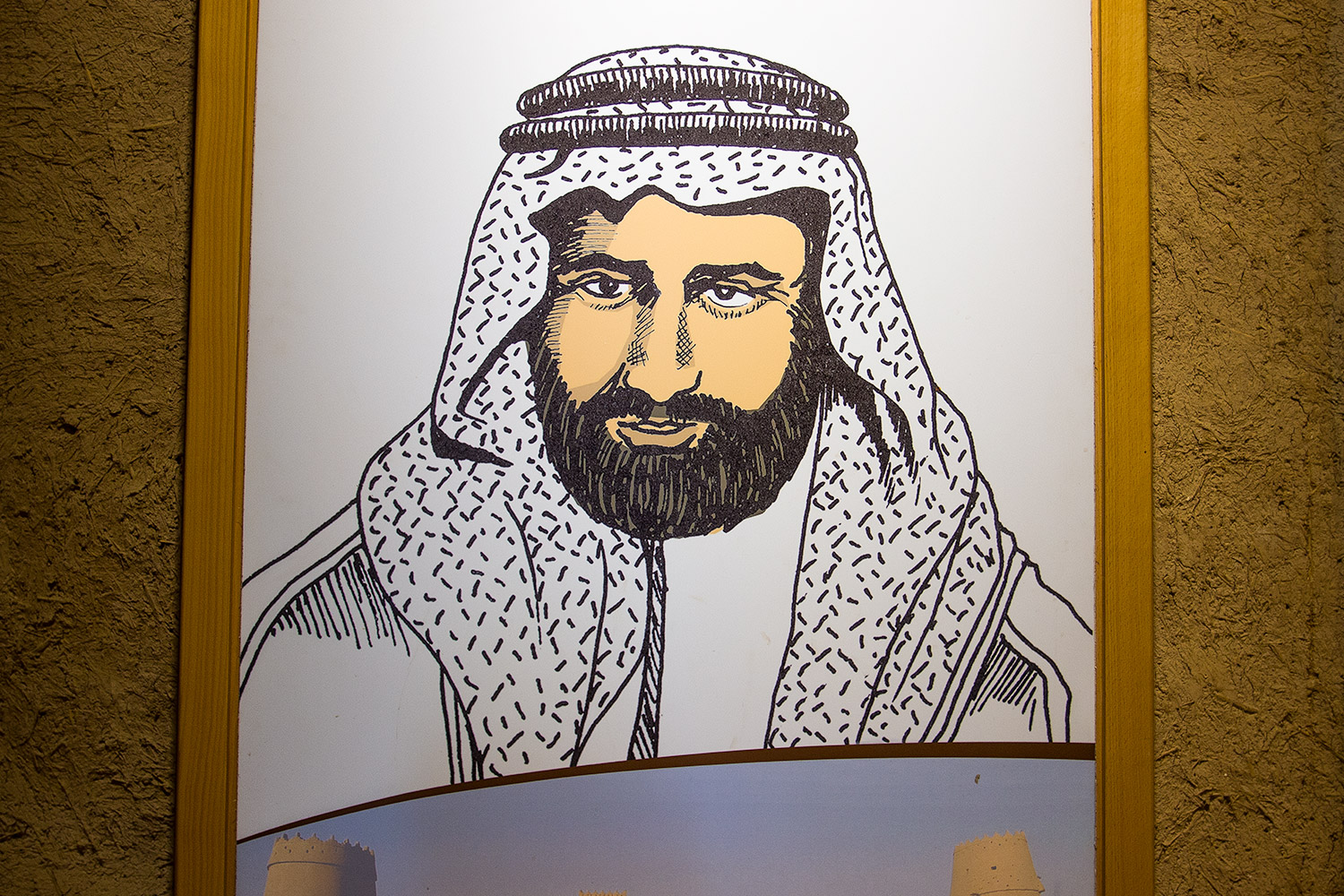How to get to Saudi Arabia
Saudi Arabia is the most challenging country to visit. It’s even easier to get into North Korea. It’s enough to buy an expensive tour and then endure an exhausting trip under the supervision of Korean intelligence officers. In Saudi Arabia, it’s simply impossible to enter; there are no tourist visas to this country at all.
Occasionally, Saudis issue transit visas for a period of three days, and some lucky individuals who manage to prove the necessity of passing through the Arabian Peninsula even have time to see something. But it can cause so many problems! After all, the paranoia in the country is no joke. The police can detain anyone with a camera on the slightest suspicion, check their documents, and inspect all the photographs. Will the transit visa stamp convince them? They don’t follow any rules. It doesn’t matter what is written there about an 18-hour visa-free transit. In practice, they simply don’t let the traveler out of the airport.
The author didn’t even consider attempting to enter this country using all those tricks. The opportunity presented itself completely by chance. Ironically, it happened right at the moment when I left the airport after returning from a trip to Israel.
It turned out that I am acquainted with King Salman bin Abdulaziz Al Saud of Saudi Arabia through four handshakes. And just at that moment, a Saudi businessman urgently needed a website, specifically from a Russian design studio. The task remained simple: send an invitation to the embassy, provide a couple of references about my managerial position from my own company, and pay an exorbitant visa fee of two hundred dollars.
The business visa of Saudi Arabia is splendid. Let’s take a look at it together, my reader. Every time I now open my passport, my eye twitches slightly at the sight of my photograph surrounded by Arabic script.
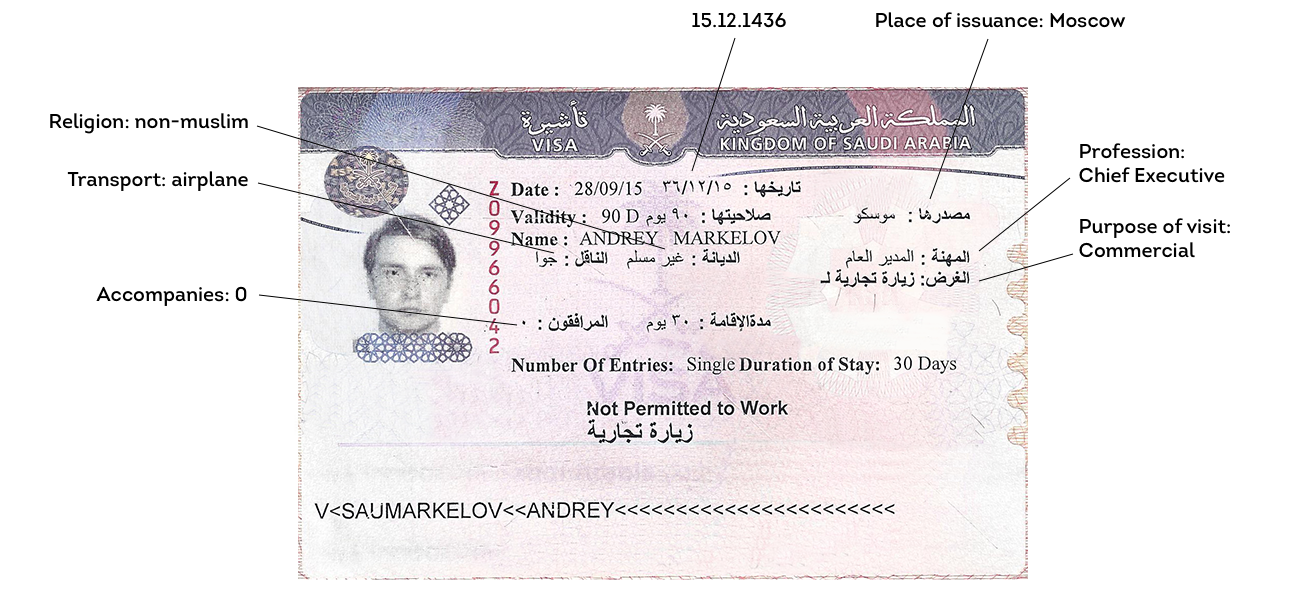
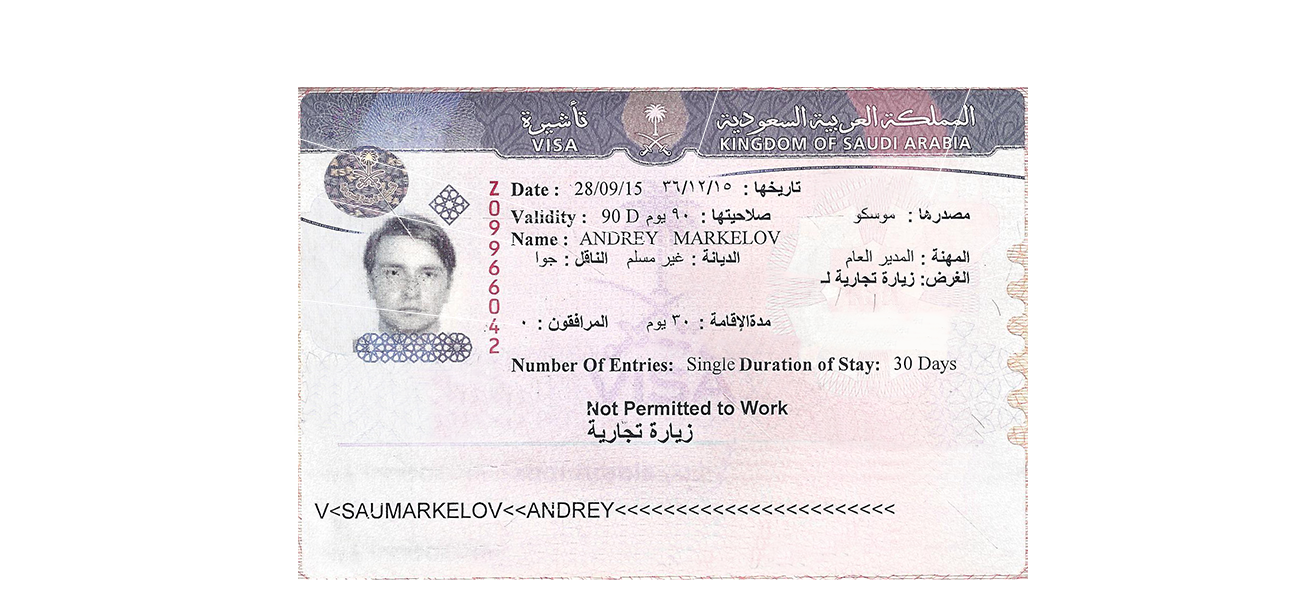
What can we learn about this country from its visa?
Firstly, in Saudi Arabia, they have their own calendar system. In the Christian world, it is customary to count dates from the birth of Jesus Christ. In the Muslim world, dates are counted from the year 622 when the Prophet Muhammad, peace be upon him, sold his house in Mecca and moved to Medina.
Let’s look at the dates indicated on the visa. The Gregorian date is 28.09.15, which corresponds to September 28, 2015. Next to it is the Islamic date written in Arabic, indicating 15.12.36, which means December 15, 1436. Thus, in Saudi Arabia, it is currently the year 1436. Moreover, this is not just a difference of 622 years; it is a fundamentally different calendar. It consists of 354 days, and the months are based on the lunar cycle.
Secondly, religion is specified in all documents. If Christianity was indicated on the application form, a note stating “Non-Muslim” is placed. This section holds immense importance in Saudi Arabia. A Muslim will be treated differently if their documents are checked during Friday prayers or in case of any disorderly conduct. And, of course, a non-Muslim cannot enter the holy city of Mecca: passports are thoroughly checked upon entry. That is why even on highways, road signs indicating alternative routes are displayed.
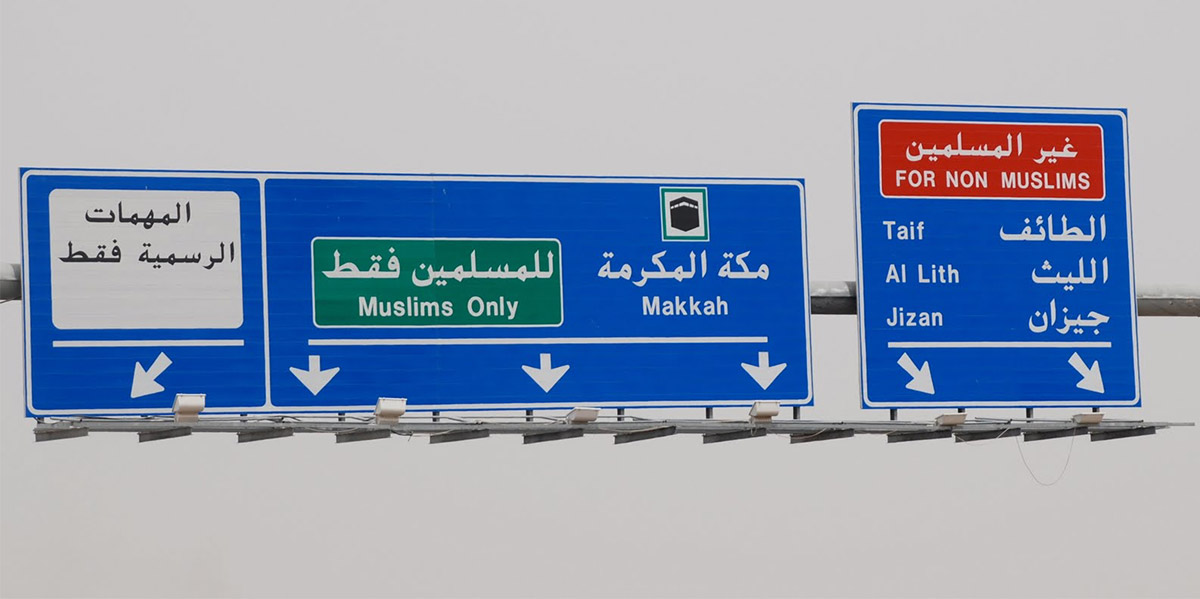
Despite all the official nature of the trip, the adventures began even in Russia. Something went wrong, and the embassy became suspicious, delaying the visa issuance for more than three weeks and ultimately calling me in for an interview.
Russian is not spoken at the Saudi embassy, and upon entry, they confiscate phones and keys. The interior of the ambassador’s office is spacious and opulent: enormous oak desks, an expensive carpet on the floor, gilded door handles, silk curtains, and antique armchairs with velvet upholstery. In short, it resembles that of a Russian official who has become spoiled with bad taste. Instead of portraits of Putin and Medvedev, you’ll find King Abdullah and two crown princes hanging on the walls.
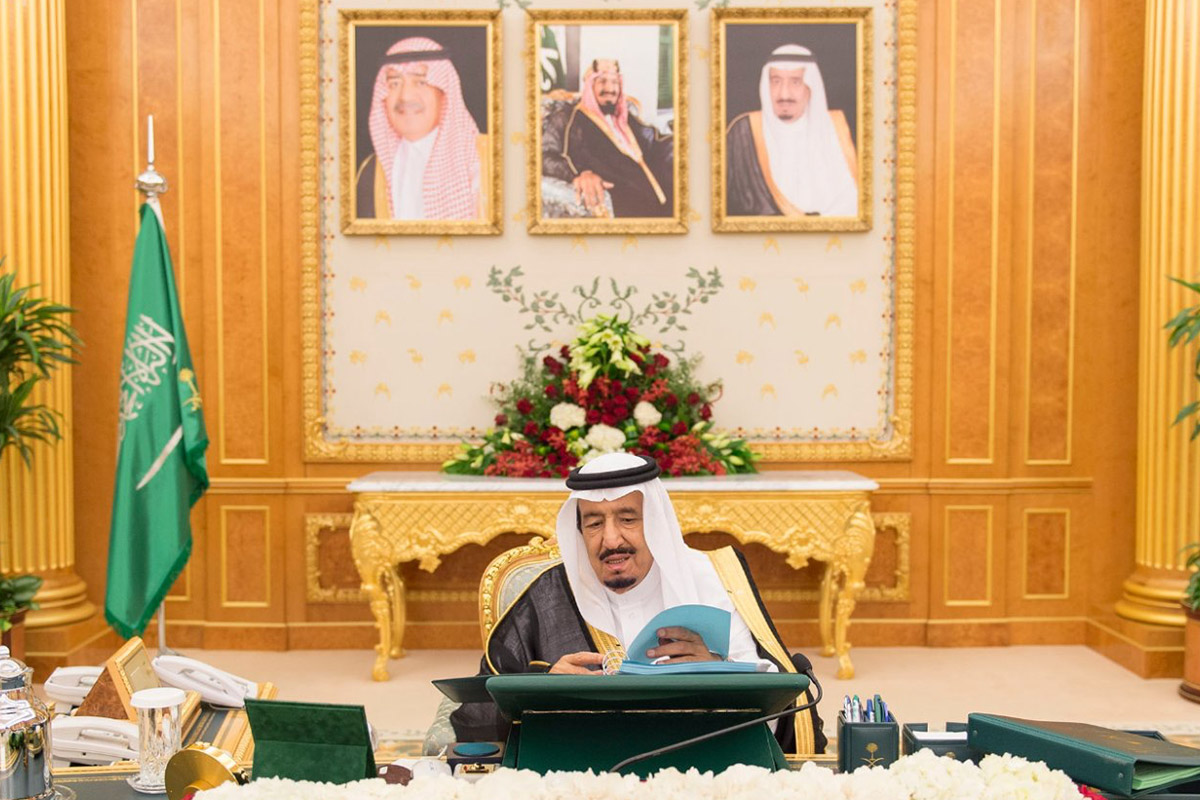
The ambassador turned out to be a young modern man of around thirty-five, dressed in a jacket with a red tie. No one at the embassy wore traditional Arab attire, but everyone was politely and ceremoniously Arabic: opening doors and entering rooms first, standing up and escorting the guest forward; they seated me in a chair and brought tea. Then the ambassador began the interrogation, speaking in English.
“Why do you want to go to Saudi Arabia?”
“One person needed a website. He said he couldn’t find a good designer in Riyadh, so he invited me.”
“That’s very strange. How did you meet then?”
“We have a mutual friend who recommended me as a specialist.”
Upon hearing the name, the ambassador subtly changed his facial expression, got up from behind the desk, and began pacing thoughtfully around the office.
“Yes, I know him a little. So, he recommended you to come and create a website for this company?”
“That’s absolutely correct.”
“Do you have a website yourself? Can you show me your company’s website?”
I hand the ambassador my business card of quite substantial thickness, designed precisely for such occasions. The addresses of both my personal and corporate websites are embossed on the thick paper. The ambassador examines it, types the website address into the browser, and spends a long time looking at my portfolio before concluding:
“I can’t understand. Your name has no connection to your line of work. What does it have to do with solar panels?”
“I’m sorry, what?”
“Solar panels. The invitation states that you’re involved in supplying solar panels.”
“Oh no, that’s not me. That’s the inviting company.”
“But the invitation says it’s you.”
“That can’t be.”
“Listen, Arabic is my native language. I probably have a better understanding of what’s written here. So, what’s the matter?”
“I have no idea. I deal with websites. And, of course, I hired a translator for all the documents. Well, I was certain that the inviting company supplies solar panels. I have no affiliation with them.”
“So, it’s a mistake then?”
“Yes, apparently a mistake.”
It turned out that the reason for my interrogation was a mistake. The Saudi businessman stated that I deal with solar panels.
“Alright. Fine, I will issue you a visa. But make sure such mistakes don’t happen again.”
“Thank you!”
“And one more thing. Do you have an office?”
“Yes, it’s on Kutuzovskiy Avenue. In the building of the former brewery... uh... I’m sorry, I forgot how to say ’zavod’ in English?”
“Factory.”
“Oh, right.”
The ambassador and I exchanged glances: “That was funny just now.”
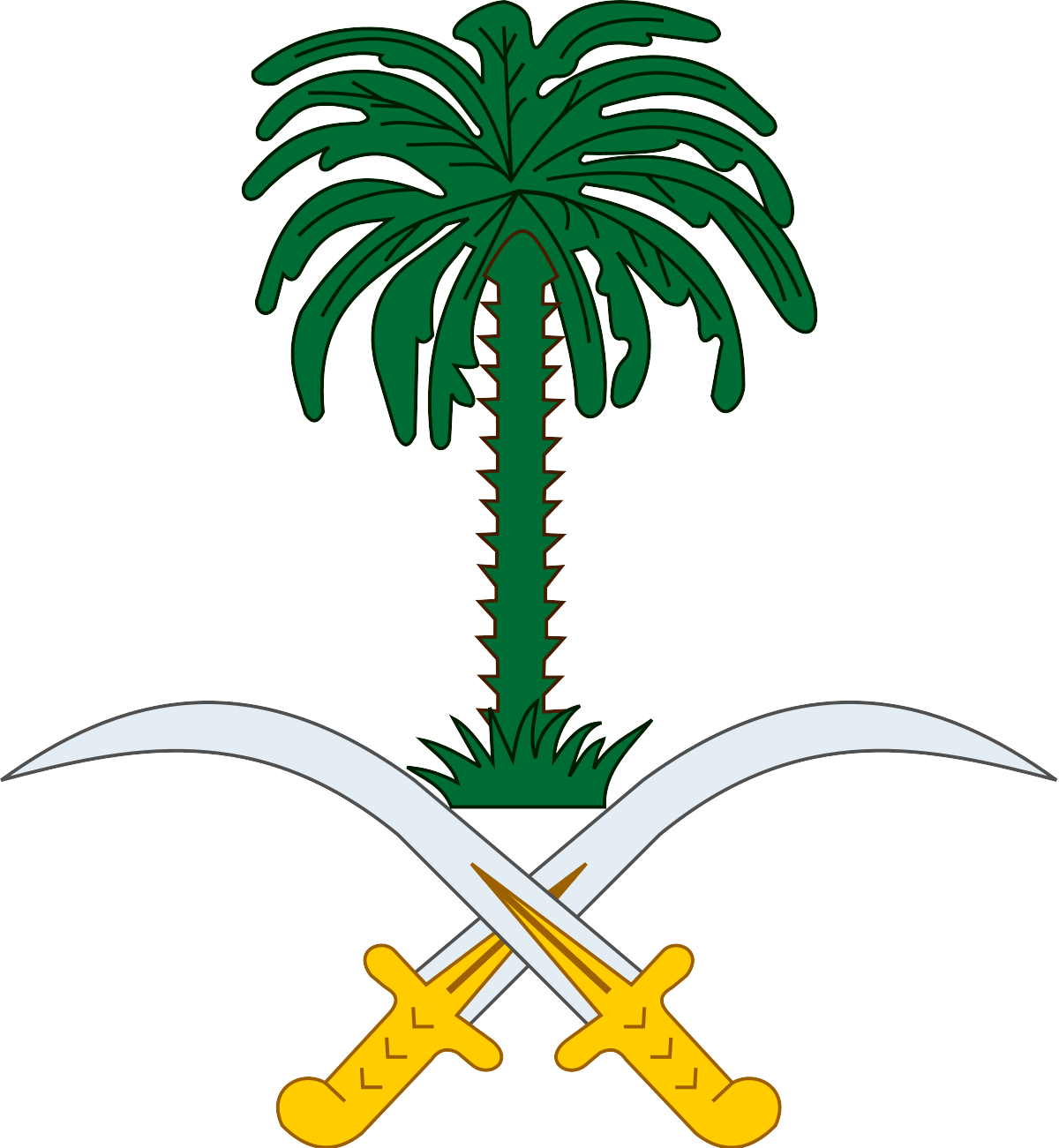
Saudi morals
The main problem of Saudi Arabia lies in its excessively dogmatic adherence to Islam.
By and large, the Quran does not contain anything that cannot be found in the Bible. Christianity, over time, has managed to discard many highly archaic interpretations, whereas Islam is not particularly inclined to do so, especially in its historical homeland.
Ban on entertainment
For example, in Saudi Arabia, cinemas and theaters are completely banned. Well, you understand: any woman can come with any man, sit next to each other — and who knows what they will do in the darkness for two hours? They might even hold hands. Such debauchery! Prohibit.
In fact, cinemas existed in the country during the 1970s and 1980s, but they were later banned under the pretext of reviving traditional Islam. Interestingly, this revival of traditional Islam coincided with the increase in oil prices. Currently, there is only one cinema in the city of Al Khobar, where offices of major Western companies are located. They promise that another cinema will soon be established in Riyadh, specifically for the local population.
Ban on women driving cars
Saudi Arabia is the only country in the world where women are prohibited from driving a car.
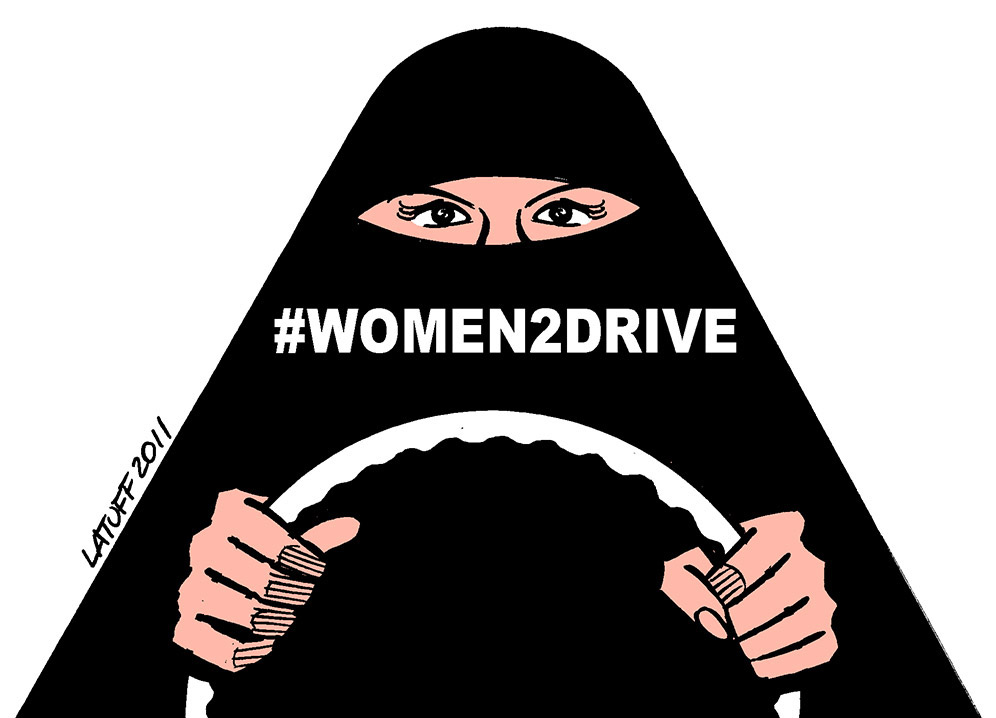
There has been a lot of noise and debate on this topic. In recent years, women have made attempts to secure their right to drive. All car rallies are harshly suppressed by authorities, and the official position of the authorities is to act foolishly.
Until women are allowed to drive and the metro is built in Riyadh, the only means of independent transportation for them in the city is taxis. Despite the strict prohibition on any contact with unfamiliar men, women are permitted to use taxis if they sit in the back seat. And, of course, women can communicate with the police, as well as security personnel and doctors, if it’s necessary and relevant.
Moreover, a woman cannot travel alone or open a bank account without the permission of her husband. However, the situation regarding women’s rights in Saudi Arabia is gradually improving: now they can even work in television and government positions.
Religious police
Another unique phenomenon in Saudi Arabia is the religious police, which is called the “muttawa.” The task of the muttawa is to lecture anyone who behaves poorly. For example, someone dressed inappropriately, swearing in public, or skipping prayer.
The muttawa rarely bothers foreigners. The author has only heard one story where a foreigner was put in a police car and held for about an hour because, as a non-Muslim, he was lingering near the main mosque in Riyadh on a Friday. But it seems that was still regular police.
Muttaweens do not wear uniforms, so it is difficult to distinguish them from ordinary Arabs, except that they are fatter and have denser beards.
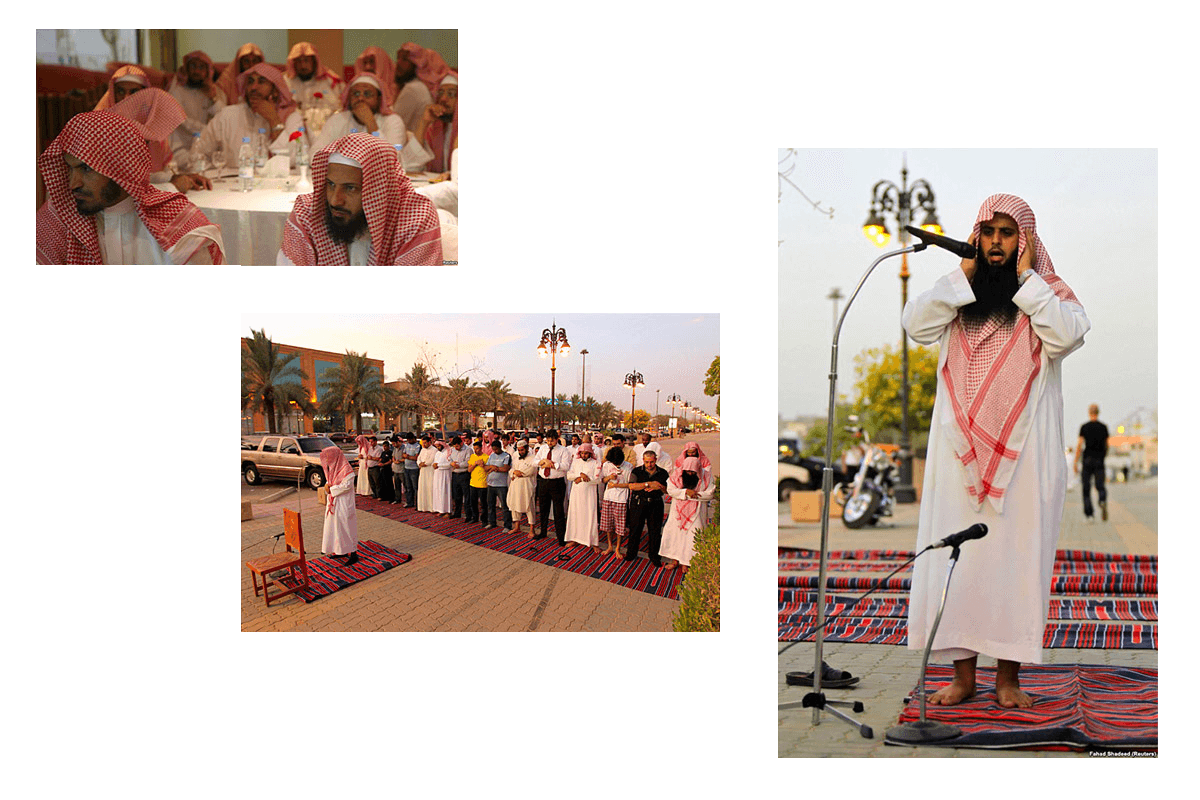
In Islam, it is customary to pray five times a day. During prayer time, the entire country briefly “shuts down.” All shops are closed. Stalls in bazaars become empty. Cashiers leave their registers in shopping centers, waiters set aside their trays, and visitors quickly finish their breakfast reluctantly getting up from the tables. Only taxi drivers, doctors, and police officers remain at work. The rest of Saudi Arabia goes to pray. Five times a day. Every day.
In any home, shopping center, hotel, or office, you can find special clocks that countdown the time to the next prayer. Every devout Muslim has a special reminder app installed on their smartphone. Even wristwatches in Saudi Arabia have a separate display showing the time of the next mosque visit.

Usually, prayer takes 10-15 minutes, but the Friday midday prayer is special. Even weakly devout Muslims attend it.
If a Muslim is caught loitering during the Friday prayer, they may be guided to the nearest mosque. However, if an outsider is spotted, except in Riyadh’s business center but rather in a different area, the disruptor of order will either be asked to move away or dealt with as mentioned in the story above.
Clothing
In Saudi Arabia, there are strict dress code rules for both men and women. For men, it is prohibited to wear shorts, and it is not recommended to wear short sleeves. Women, on the other hand, are required to cover almost their entire bodies. Wearing a hijab is mandatory for them.
The hijab is not a specific type of clothing; it generally refers to any “uniform” that covers the body from head to toe. At the very least, the hijab includes a headscarf and a long Arabic dress called an abaya. This is essentially sufficient for Saudi Arabia, and few expatriate women working here dress in this manner.
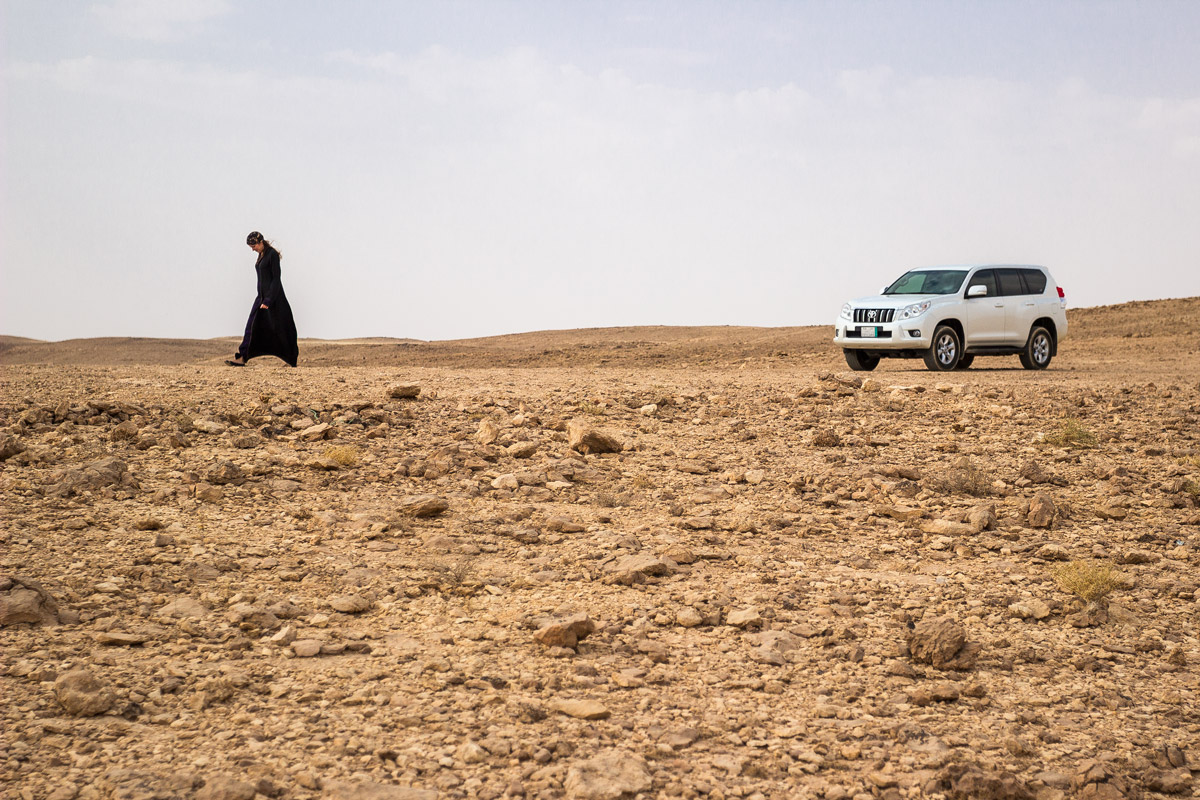
Sometimes foreign women take a little risk and remove their headscarves in public. In most cases, nobody pays attention to it, but sometimes other women approach and make a remark: what is this impropriety?
It would be worse if a woman without a hijab encounters the religious police — they will persist until the headscarf is worn. In extreme cases, they may escort her to her husband, but nothing serious will happen.
There have been egregious incidents due to the inappropriate actions of the muttawa. In 2002, a fire broke out in a girls’ school in Mecca. It is reported that 15 girls died in the fire, including some who ran out in improper clothing. Instead of rescuing them from the fire, the religious police forced them back inside to change their attire. Saudi authorities deny the incident.
However, the overwhelming majority of Saudi women already wrap themselves in black clothing to the extent that only a narrow slit for their eyes remains, sometimes even covered with semi-transparent black fabric. This intimidating attire, which is associated with female suicide bombers, is actually common religious attire in Islam. It can be extremely uncomfortable, especially when wanting to eat at a restaurant.
Naturally, all these prohibitions and dress codes apply only to public places. At home, women can wear whatever they want. Therefore, there are no issues with clothing in Saudi Arabia — you can buy absolutely everything, starting from evening dresses...

...and ending with ripped jeans and mini-skirts.

It’s interesting: what can be displayed on mannequins cannot be depicted on live people. All indecent magazine covers, films, and music albums undergo censorship. If there is a depiction of a nude female body, part of the clothing is added to the photograph or it is simply marked over with a marker. It looks ridiculously silly.

People and photography
The attentive reader will notice that although the mannequins are dressed in fashionable clothing, they lack heads. This is likely an expression of another Islamic rule — the prohibition of depicting people. You will not find a statue or portrait in any Islamic country. Mosques may feature exquisite ornamentation, but never an icon of Muhammad. In Islam, it is believed that one can only communicate directly with God, so there can be no icons, and any image or sculpture can be perceived as creating an idol for oneself.
However, a clever justification has been devised for photography in Saudi Arabia: a photograph is the captured light on paper. And light is given by Allah. Therefore, taking photographs of people is allowed, but drawing is not permitted.
Of course, this rule does not apply to kings. For some reason, it is permissible to depict them, including on currency. Portraits also hang in museums without issue. Whether this rule is applied differently or has fallen out of fashion, nobody has a clear answer.
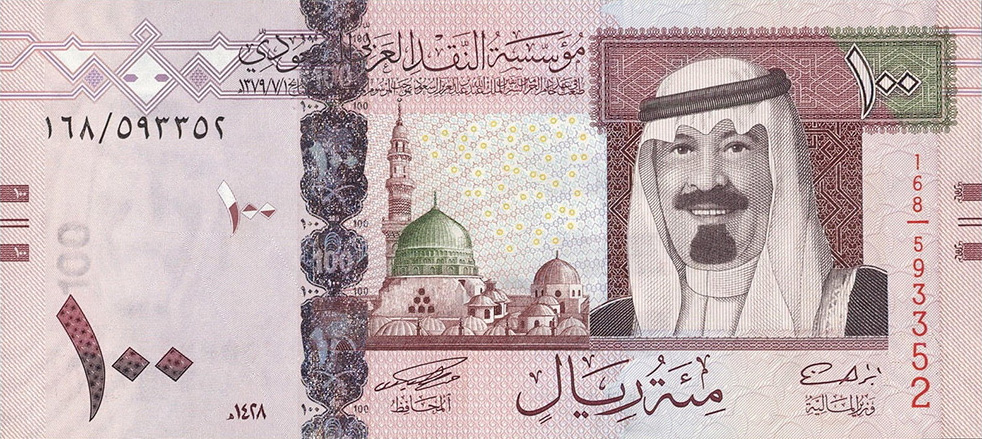
Nevertheless, photography in Riyadh is highly discouraged. A tourist walking in 40-degree heat already looks crazy enough — taxi drivers stop and ask what’s happened. So you can imagine the situation when someone is walking around with a big camera, capturing everything in sight.
You can take photos without any problems in museums and in nature, but in the capital city, photography is strictly regulated. In shopping malls, you wouldn’t even dare to take out your phone — guards are always on high alert. It’s better to keep your camera in your bag altogether. And God forbid you find yourself with a camera near the central mosque during prayer time or near a government building. There’s no escaping trouble in those situations.
Gender segregation
All restaurants, cafes, and many clothing stores in Saudi Arabia are divided into two sections with separate entrances and partitions between them. There are two options for dividing a restaurant:
1. A section exclusively for men and a section exclusively for women.
2. A section exclusively for men and a section exclusively for families.
This rule applies to absolutely all establishments. For example, this is how a Saudi McDonald’s looks like. It has two entrances: one for men and another for families. In the family section, either a woman or a man with a woman can enter. These rules apply to both Saudis and foreigners.
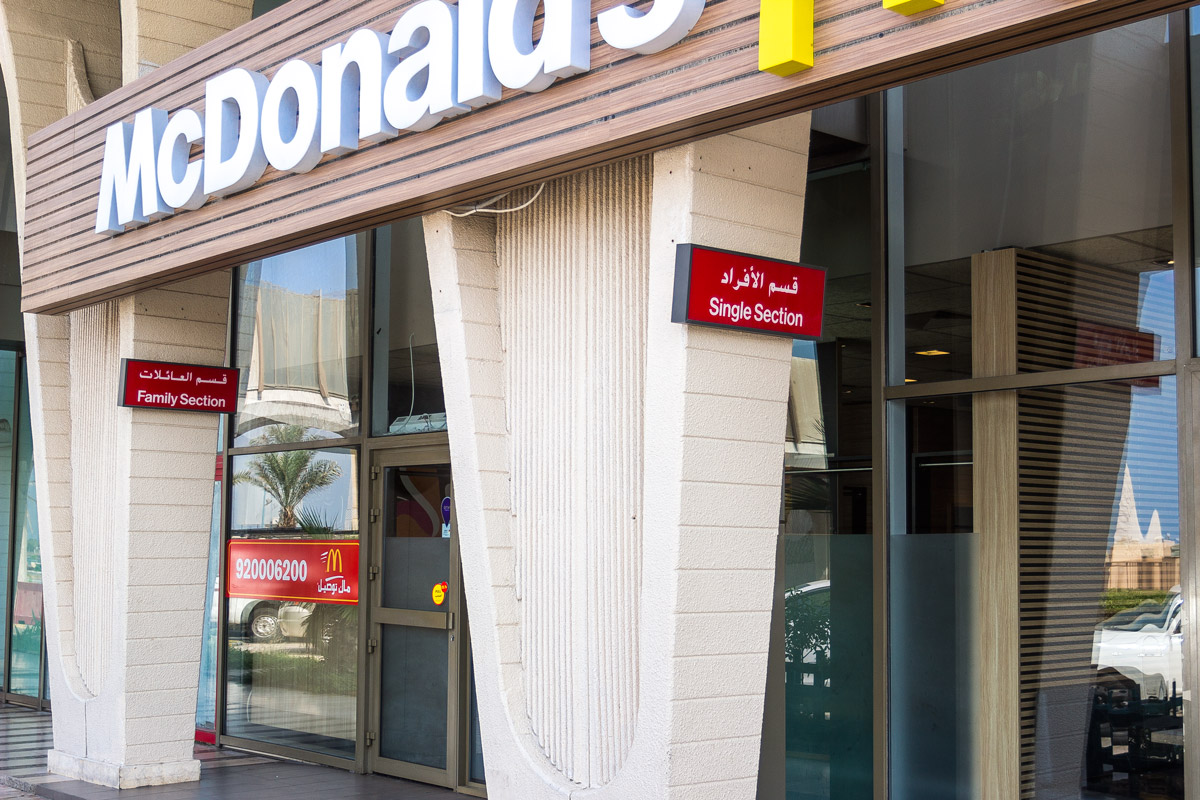
In large shopping malls where there are Western-style open “food courts,” the division is more conditional. In this McDonald’s, for example, there are two cash registers. The left one is exclusively for women, and the right one is exclusively for men. There is a partition between the cash registers.
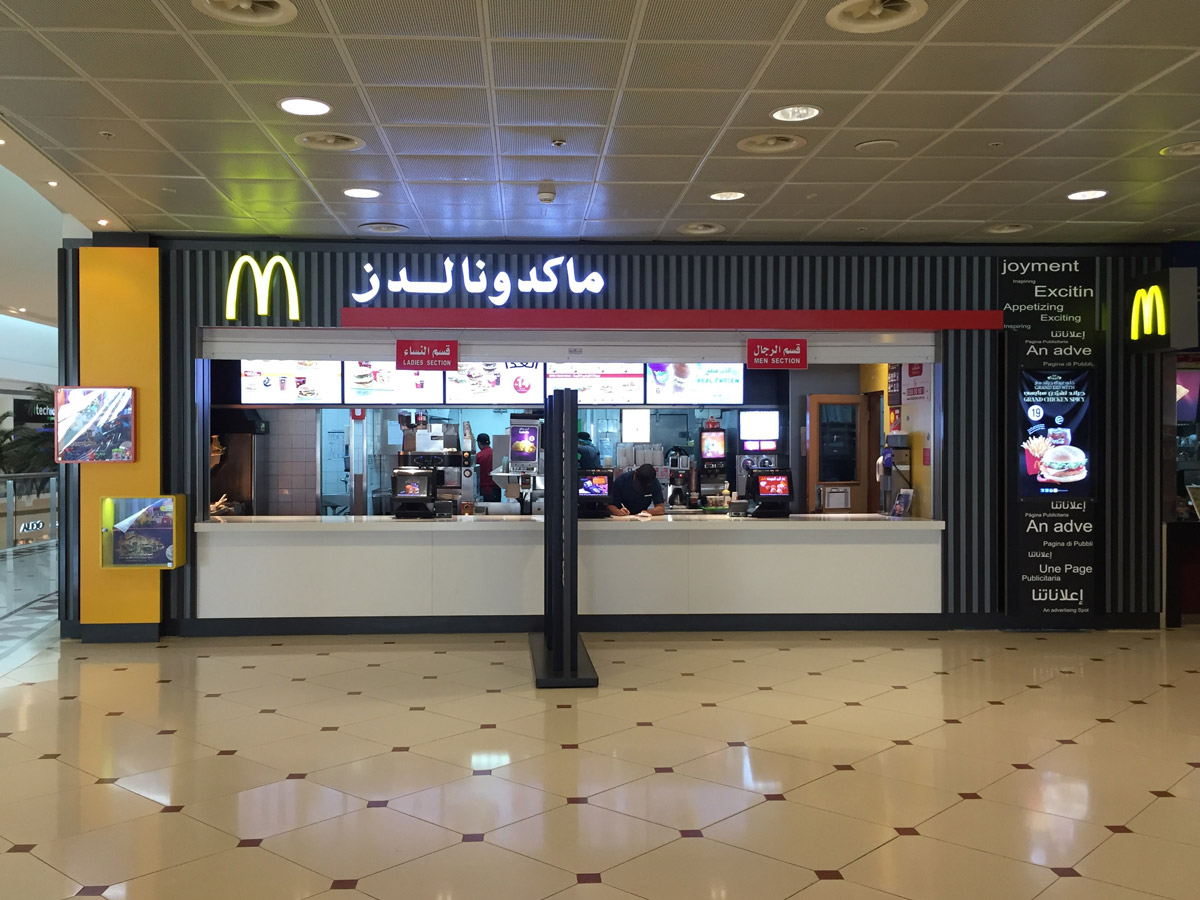
Under the same pretext of gender segregation, communication means are severely restricted in Saudi Arabia. It is understandable that all pornographic websites are blocked, although bypassing them is not a difficult task.
However, what the Saudi authorities have done with social media! No, they did not block them. Facebook, WhatsApp, Skype, and other services are operational in the country. However, only text messages are allowed. You can write on Skype, but calling phones is not permitted. WhatsApp functions, but only for text messages — neither calls nor voice messages can be sent. Blocking calls for women only was not possible, so it had to be disabled for everyone. Only mobile communication was left intact.
Alcohol
Naturally, alcohol is prohibited in Saudi Arabia. The prohibition of consuming alcoholic beverages is one of the fundamental laws of Islam. This prohibition applies to almost all Islamic countries, but it is particularly severe in Saudi Arabia.
In most Muslim countries, alcohol consumption is prohibited only for Muslims, while foreigners are allowed to consume it. Dubai airport is simply filled with alcohol. Manama has plenty of hotels and bars where one can have a drink.
Alcohol is strictly and unequivocally prohibited in Saudi Arabia. It is not allowed to drink alcohol for both Saudis and foreigners. Selling or bringing alcohol into the country in any form, including candies with liquor filling, is not permitted. Even before departing from one’s home country, it is highly advised not to consume alcohol. The slightest smell of alcohol on one’s breath is sufficient for deportation from Saudi Arabia.
Naturally, all of this does not mean that alcohol cannot be obtained in the country.
Firstly, diplomats themselves bring it in. Surprise! A significant flow of alcohol into Saudi Arabia is organized by numerous ambassadors from countries such as the United States, Russia, and others. People drink heavily at closed parties held in embassies. Expatriate homes always have a hidden bottle or two. Undoubtedly, even Saudi ambassadors indulge occasionally, although rarely. Rumor has it that they particularly enjoy Black Label whiskey.
Secondly, there is a country nearby called Bahrain, where alcohol is allowed for non-Muslims. So, after Friday prayer, crowds of Saudis head to Bahrain to get drunk over the weekend and return on Sunday. It takes just a few hours by car to get here from Riyadh, and it’s even easier from Dammam — just cross the bridge. Well, those who are wealthier fly to Dubai or London.
Thirdly, alcohol can be obtained through connections, much like marijuana in Russia. It’s supposed to be strictly prohibited, but everyone is smoking it. The same goes for alcohol in Saudi Arabia. They say that a liter of the most basic wine would cost around 500 dollars.
But when it comes to extramarital relationships, it’s much more complicated. A taxi driver mentioned that couples manage to secretly meet somehow, and there are even services of prostitutes, mostly from poor migrant families. However, this is very difficult and carries serious consequences — at the very least, public flogging with sticks.
Literacy
I haven’t studied how the education system is structured in Saudi Arabia, so I can only speak about the level of literacy. In my travels, I encountered only ignorant people.
Firstly, in Saudi Arabia, hardly anyone speaks English. They don’t know the language in hotels, shops, or taxis. You say “airport” to the taxi driver, and he rolls eyes. You repeat, “aero-port.” He doesn’t understand. You show the airplane icon on your phone, and he says, “A-a-a! Mataar!” In the Arabic language, there are hardly any loanwords, and illiterate taxi drivers don’t even understand “airport” or “taxi.” But credit must be given — they immediately make phone calls to their acquaintances and ask for a translation.
You can partly understand the taxi drivers. Most of them are migrant workers and may not be highly educated. However, here is a dialogue that took place with one of the security guards — an Arab who spoke English fairly well:
“Good day. Where are you from?”
“From Russia.”
“Rus... Russia? Ah, Russia! I’ve heard about this country. It’s my first time seeing a Russian!”
Another Arab, an airport employee, looked at the passport for a long time when the author went to the wrong counter. The passport had “Russian Federation” written prominently on it. The Arab fumbled with the passport and eventually asked, “So, what country are you from?”
There is also a popular online interview with a Saudi figure who directly claimed in a video that the Earth cannot be rotating. He explained it very simply using technological progress as an example: if the Earth were rotating, airplanes would only be able to fly in one direction, following the rotation. They wouldn’t be able to fly in the opposite direction; they would hover in place in the air. However, he said, “I flew from Riyadh to Beijing and back — and arrived perfectly fine!”
In the National Museum of Riyadh, there are several enormous halls dedicated to explaining the scientific theory of the origin of the world. The posters openly state that life emerged on the planet 3.8 billion years ago, depicting the movement of continents from the supercontinent Pangea. In one of the halls, there is a skeleton of a mammoth or an elephant on display.

Even evolution is depicted, albeit focusing on fish, plants, and animals. However, when it comes to the stage of human origins from apes, the narrative abruptly stops — apparently, censorship kicks in after all.
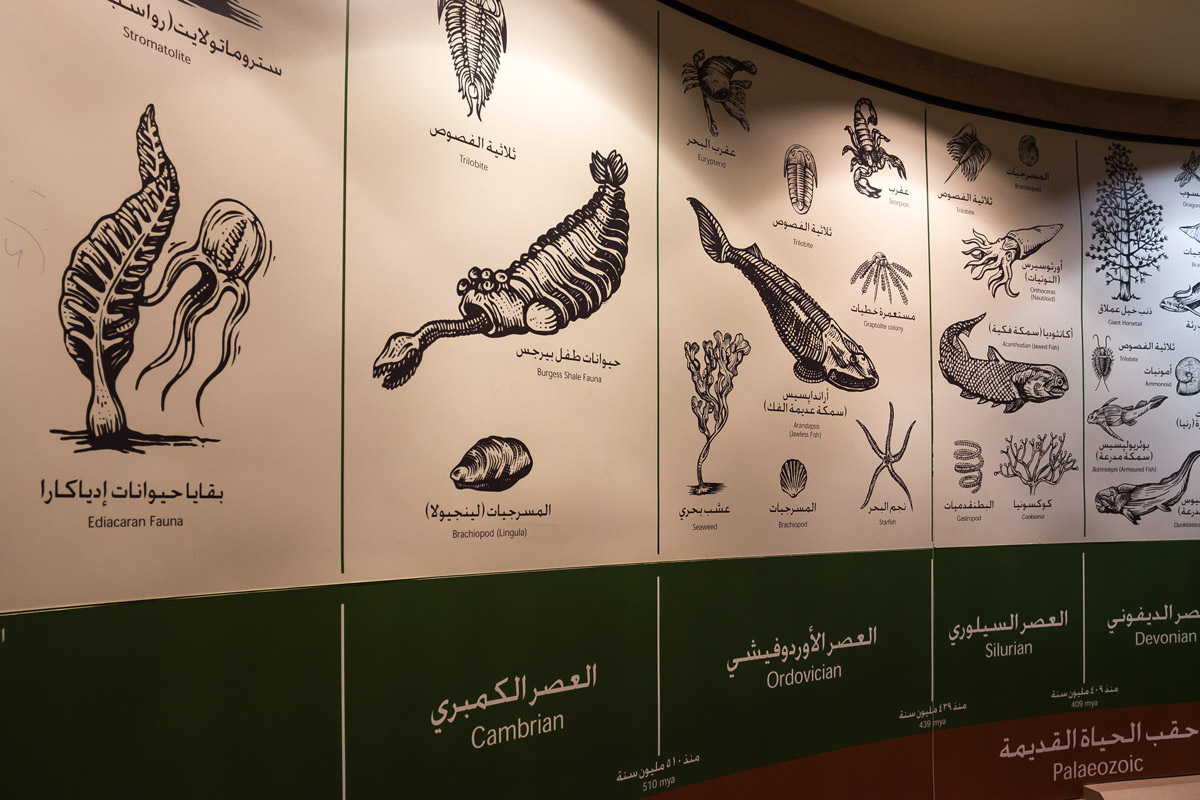
Despite this, I suspect that there is a lack of comprehensive education in Saudi Arabia. Saudis simply do not need it as long as they have oil.
Oil
The Saudi regime relies on oil. The kingdom pours as much money as it can into its pockets and extravagant projects. It spends the rest on propagating its generosity, providing citizens with free water, almost free electricity, and cheap gasoline. It also artificially maintains a stable exchange rate for the dollar for many years.
The key point is that thanks to oil, the country can afford to impose minimal taxes on local businesses. Saudis pay only 2.5% income tax. However, any foreign business operating in the country is required to give a controlling stake to a Saudi citizen — otherwise, the company simply cannot be established. And that individual may not even actively participate in the business, only receiving profits.
This is their social contract. The Kingdom offers great business opportunities, a stable course, and numerous free perks. It shows off to neighboring Dubai and Bahrain. It grants its subjects the right to consider themselves superior to other Muslims. In return, it completely takes away freedom and controls all aspects of life.
Saudi Arabia from a distance gives the impression of an oil giant that can manipulate fuel prices at will and create global crises. In reality, it’s not the case. Power in the Kingdom itself depends on oil, and any price fluctuation greatly affects the budget — even more so than in Russia. It’s just that some things are structured differently there, so it’s easier for them to pretend that everything is fine.
But in reality, everything is very bad. And when the Saudi social contract starts to falter — and it will start to falter — all the royal arrogance will dissipate, and prohibitions on cinemas and women driving will go down the drain. That’s when will surface corrupt Saudi princes, who smuggle drugs by the kilos into Lebanon and engage in sex with underage boys in Britain.
Arsy-varsy
And finally. It’s well-known that Arabs write from right to left. But not many people know that for Arabs, everything is from right to left, including all computer interfaces. Even the progress bar during program installation fills up in reverse.
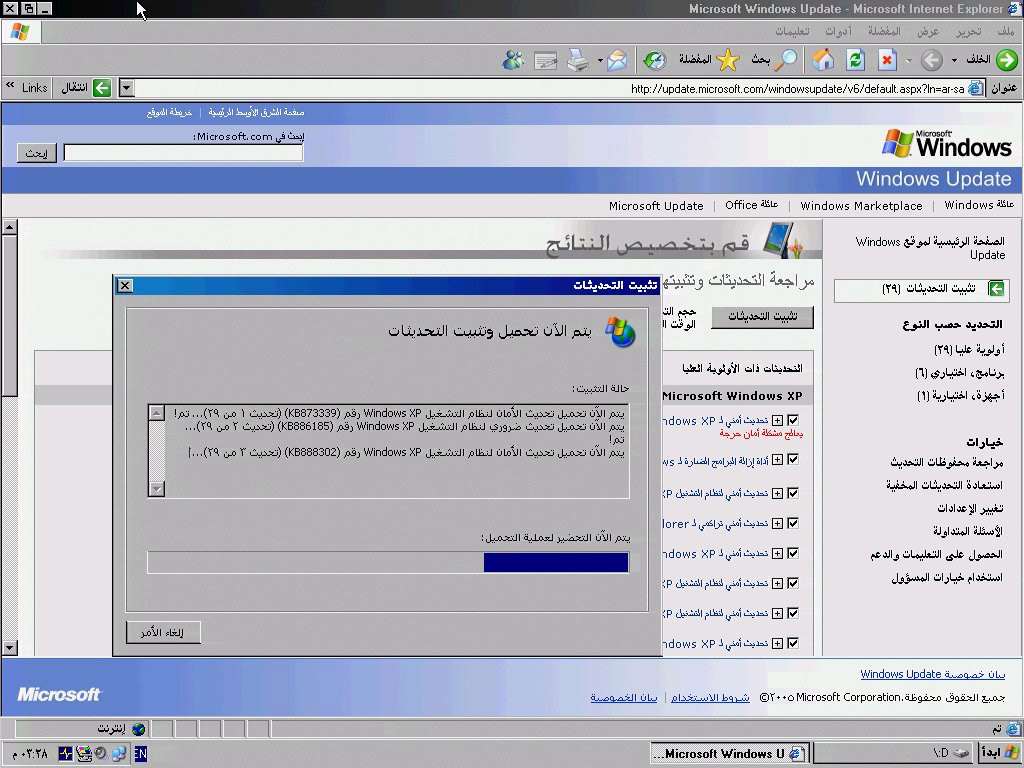
Now the reader has seen everything.
